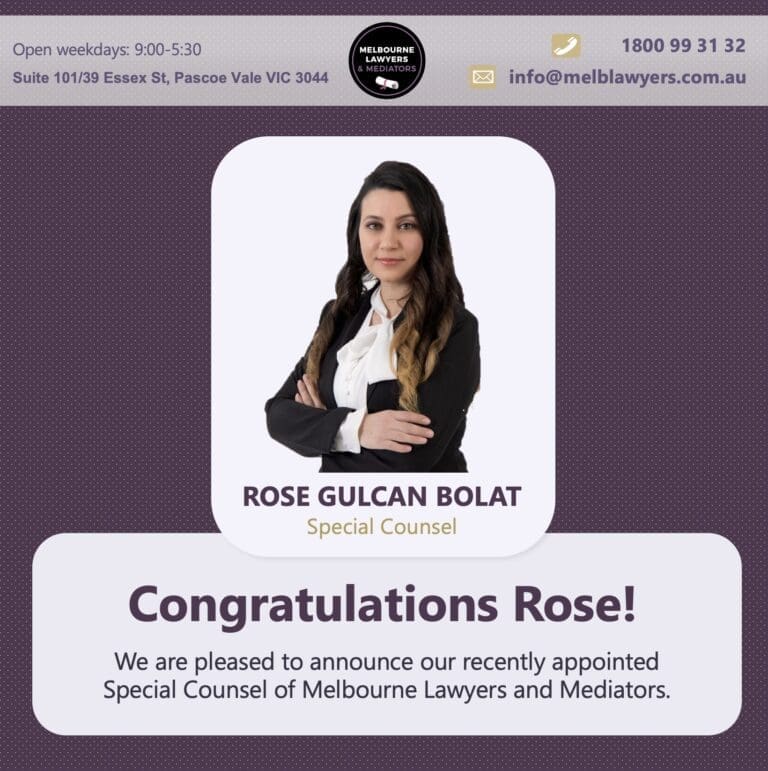Divorce can feel like an emotional whirlwind – unsettling, stressful, and filled with uncertainty. You may be asking: Where do I even begin? Or what happens to the kids, the house, and the finances? This blog is here to give you clarity.
Whether your separation is amicable or complicated, understanding your legal rights is the first empowering step. And if you’re in Melbourne, you’re not alone – help is at hand.
Understanding Divorce in Australia
In Australia, divorce is legally recognised as the end of a marriage. The only ground for divorce is the irretrievable breakdown of the marriage, proven by 12 months of separation.
Key Requirements for Divorce:
- You must be separated for at least 12 months
- One or both parties must regard the relationship as over
- If married for less than two years, you must attend counselling or seek special permission from the court
Importantly, divorce does not settle financial or parenting matters – those are separate legal processes you’ll need to undertake.
What You’re Entitled to Know – and Deserve to Understand
1. Separation Doesn’t Always Mean Moving Out
You can be “separated under one roof,” especially when children or finances make moving out immediately difficult. You’ll need to prove the separation to the court with things like:
- Sleeping in separate bedrooms
- Not sharing meals or social activities
- Telling family and friends about the separation
2. Parental Responsibility & Child Custody
Under the Family Law Act 1975, the child’s best interests are the central focus. Generally, both parents share equal parental responsibility, which means making major decisions jointly (education, health care, religion).
Parenting arrangements can include:
- Equal shared care (where appropriate)
- Primary care with one parent and visitation rights for the other
- Supervised contact, where required for safety
Court orders or Parenting Plans (written agreements) can formalise these arrangements.
Property Settlement: It’s Not Automatically 50/50
A common misconception is that assets are split down the middle. In reality, property settlement depends on various factors, and not every contribution is financial.
The court considers:
- What you own and owe (assets and debts)
- Financial contributions – income, savings, investments
- Non-financial contributions – homemaking, parenting, renovations
- Future needs – age, health, earning capacity, care of children
- Whether the split is just and equitable
This process is separate from your divorce and must be finalised within 12 months of your divorce becoming final.
Spousal Maintenance – Are You Eligible?
If one partner is unable to support themselves after separation, spousal maintenance may be payable. This could be due to:
- Limited income or employment prospects
- Health issues
- Caring responsibilities
The paying party must also have the financial capacity to contribute. This can be decided by agreement or through the court.
Common Divorce Myths (Busted)
Let’s debunk a few widespread misunderstandings:
- “I’ll lose everything if I move out.”
Property rights don’t disappear if you leave the family home.
- “The kids will always stay with the mum.”
Parenting arrangements depend on what’s best for the child, not outdated stereotypes.
- “Cheating affects property settlement.”
- Australia has a no-fault divorce system. The reasons for separation don’t usually influence financial outcomes.
Why Legal Guidance Matters
Even amicable divorces can take a wrong turn without clear legal advice. A qualified Melbourne Divorce Lawyer can help you:
- Understand your rights under Australian law
- Secure fair parenting and financial arrangements
- Prepare and lodge legal documentation
- Avoid costly delays or disputes
Your legal support should be realistic, empathetic, and rooted in your best interests – not just legal theory.
Steps to Take If You’re Considering Divorce
Here’s a simplified roadmap to help you navigate the journey:
Step 1: Seek Support
Talk to a family lawyer. Early advice makes all the difference.
Step 2: Consider Mediation
Resolve disputes collaboratively if possible. It’s faster and less expensive than court.
Step 3: Apply for Divorce
Either individually or jointly. Submit your application online via the Federal Circuit and Family Court of Australia.
Step 4: Finalise Parenting & Property Matters
Through negotiation, mediation, or court orders.
Step 5: Move Forward
Update your will, finances, and future plans with confidence.
A Final Word: You’re Not Alone
Divorce is not just a legal process – it’s an emotional, social, and financial shift. But you don’t have to go through it blindly.
Arming yourself with accurate information and compassionate legal guidance will give you peace of mind and a sense of control when everything else feels uncertain.
Whether you’re just thinking about separation or ready to file for divorce, speaking with a knowledgeable Melbourne Divorce Lawyer can help you plan the best path forward.
Melbourne Lawyers & Mediators is here to support you with family law guidance that’s practical, respectful, and focused on your future.





